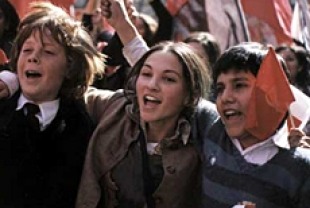The Winning Class in today's America is having things go their way in the corridors of power in Washington and in posh gated communities. Because they are successful, they feel morally superior to others. Often they think that the poor have not worked hard enough and deserve what they get — which is very little. The inimitable Protestant preacher William Sloane Coffin stated: "A nation that puts so much stress on getting ahead has a hard time dealing with those who fall behind. If you're successful, you seldom identify with failure. This is proved by the fact that integration of the races has already resulted in an even greater segregation by class. The so-called underclass has all the markings of a subordinate caste. In the long run, I believe, class will prove a harder nut to crack than race."
What he said is proving to be true, but don't expect Hollywood to deal in any substantive way with this ethically charged issue. For that, you need to look to independent and foreign language films. A particularly good one is Machuca, a film from Chile about a young boy's coming-of-age. It also happens to be one of the most gripping and soul-stirring dramas ever made about the virulence of class warfare and its manifold toxins.
In Santiago, Chile, during 1973, the democratically elected socialist government of Salvador Allende is under siege. Eleven-year old Gonzalo (Matias Quer) lives in the comfortable suburbs with his attractive mother (Aline Kuppenheim), his sexy teenage sister, and his father (Francisco Kings), a shrewd entrepreneur who sees that the regime in power is not good for business. Gonzalo is a shy boy who is picked upon by a bully at a private school run by Father McEnroe (Ernesto Malbran). When the principal admits five poor boys from the neighborhood, the students immediately look down their noses at them. The wide gap between them is evident at the pool where the rich boys wear swimming suits and the new boys have only their underpants. When the bully picks on Pedro Machuca (Ariel Mateluna), Gonzalo stands by him, and the two become friends. The newcomer takes him along when his uncle (Alejandro Trejo) and his cousin Silvana (Manuela Martelli) sell flags at two competing demonstrations — one by the nationalists and one by the Communists. Gonzalo is amazed by the energy at these political gatherings and attracted to the sexual playfulness of Silvana, who calls him a "snob."
At home, Gonzalo is irritated with his mother for carrying on a love affair with an older wealthy man (Federico Luppi) who insists on giving him book versions of the Lone Ranger to win his approval. It doesn't work. When he is invited to visit Pedro's home in a shantytown where he lives, he is stunned by the differences in their lives. He meets Pedro' mother (Tamara Acosta) and his drunken father (Luis Dubo), who points out to the boys that they will always exist in two separate worlds and never be able to bridge the distance between them.
Class warfare emerges at the private school where Father MacEnroe comes under fire for attempting to integrate the shantytown boys into the elite circles. The parents want him out, and they use every epithet they can think up to condemn his allegiance to the Communists. When the resistance to Allende finally comes, the fallout in the school begins with the principal. In a final act of spiritual defiance, the priest eats all the wafers for the Eucharist at the church and declares "this place is not sacred anymore." Pedro, who sees the courage of this man's convictions, says goodbye to him and is immediately dismissed from the school by the new right-wing principal who can't wait to get rid of the shantytown boys.
Director Andres Wood grew up in Santiago and was educated at a private school similar to the one in the film. He has fashioned a riveting drama that vividly conveys the class conflict propelling the undertow of hatred and violence which brought down democracy in Chile. The changes that Pedro effects in his privileged friend Gonzalo are deep and life-transforming. Best of all is the heroic portrait of the radical Catholic priest whose noble educational experiment mirrors the Gospel and provides an ideal that all can strive to achieve.
Machuca is Chile's entry in the Best Foreign Language Film category at the Academy Awards.
